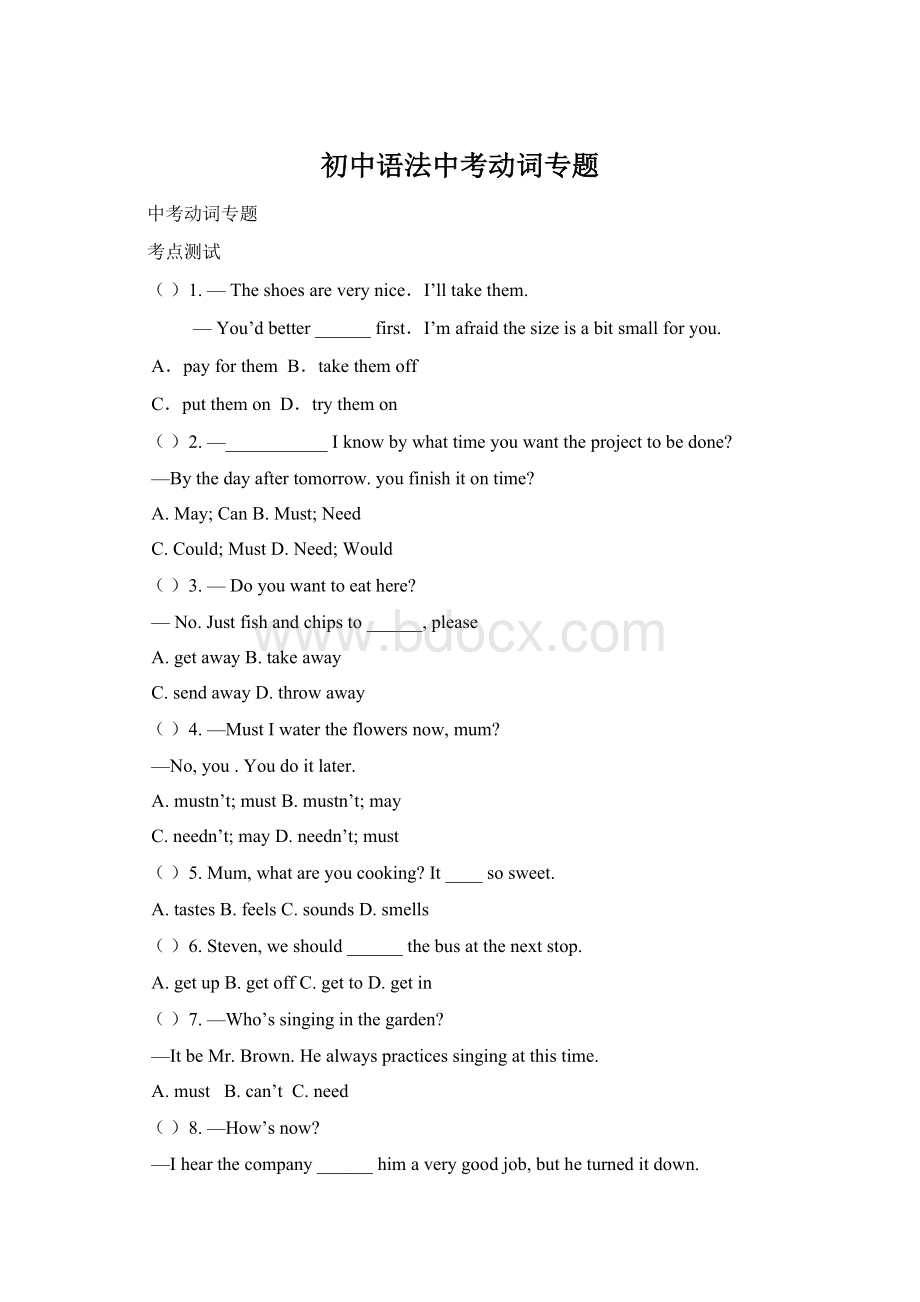初中语法中考动词专题.docx
《初中语法中考动词专题.docx》由会员分享,可在线阅读,更多相关《初中语法中考动词专题.docx(20页珍藏版)》请在冰豆网上搜索。

初中语法中考动词专题
中考动词专题
考点测试
()1.—Theshoesareverynice.I’lltakethem.
—You’dbetter______first.I’mafraidthesizeisabitsmallforyou.
A.payforthemB.takethemoff
C.putthemonD.trythemon
()2.—___________Iknowbywhattimeyouwanttheprojecttobedone?
—Bythedayaftertomorrow.youfinishitontime?
A.May;CanB.Must;Need
C.Could;MustD.Need;Would
()3.—Doyouwanttoeathere?
—No.Justfishandchipsto______,please
A.getawayB.takeaway
C.sendawayD.throwaway
()4.—MustIwatertheflowersnow,mum?
—No,you.Youdoitlater.
A.mustn’t;mustB.mustn’t;may
C.needn’t;mayD.needn’t;must
()5.Mum,whatareyoucooking?
It____sosweet.
A.tastesB.feelsC.soundsD.smells
()6.Steven,weshould______thebusatthenextstop.
A.getupB.getoffC.gettoD.getin
()7.—Who’ssinginginthegarden?
—ItbeMr.Brown.Healwayspracticessingingatthistime.
A.mustB.can’tC.need
()8.—How’snow?
—Ihearthecompany______himaverygoodjob,butheturneditdown.
A.donatedB.servedC.offeredD.introduced
()9.—Isthelong-hairedmanBruce?
—No,it_______behim.He’sinNewYorknow.
A.can’tB.mustn’tC.needn’tD.maynot
()10.—DoyouknowthelatestinformationaboutFlightMH370?
—I'venoidea.Let's________theTVtowatchthenewsprogramme.
A.turnonB.turndownC.turnupD.turnoff
()11.Thiskindofpeachlooksreallynice,butit_____verysour.
A.tastesB.looksC.feelsD.sounds
()12.—AreyougoingtoBraziltowatch2014FIFAWorldCupthissummer?
—I’mnotsure.Ittime.
A.dependsonB.caresaboutC.agreestoD.findsout
()13.—Iforgottobringmydictionary.CouldIuseyours?
—Yes,you______.
A.canB.mustC.couldD.should
()14.Theskirt_______asifitismadeofsilk.
A.soundsB.tastesC.feelsD.smells
()15.CocoLee was born in HongKong but_______in America.
A.picked upB.gave up C.grew upD.dressedup
()16.—Let’sgoclimbing,shallwe?
—You_______bejoking!
Don’tyouknowI’mafraidofhighplaces?
A.mayB.canC.mustD.should
()17.LiuHuan,afamousmalesinger,haslonghair,becausehe______longhair.
A.usedtohaveB.isusedtohaving
C.isusedforhavingD.isusedtohave
()18.—Let’splanasurprisepartyforourclass.What’syouridea?
—Whynot______ashortplay?
A.getonB.keeponC.haveonD.puton
()19.—Bob,whereisLinda?
—She_______beinthelibrary,butIamnotsure.
A.mustB.mayC.needD.hasto
()20.Listen,thecountrymusic______sosweet.
A.smellsB.soundsC.feelsD.looks
考点精讲精练
考点一连系动词(不能单独使用,后面要接表语。
)
1.be动词的用法
口诀:
我用am,你用are,is连着他、她、它。
单数名词用is,复数名词全用are.
变疑问,往前提,句末问号莫丢弃。
变否定,更容易,be后not莫忘记。
疑问否定任你变,句首大写莫迟疑。
2.look,taste,smell,sound和feel等感官动词,可以用作连系动词,后面常接形容词作表语。
如:
Thesculptureslookreal.这些雕塑看起来很逼真。
Themooncaketastesgood.这个月饼真好吃。
Youranswersoundsright.你的回答听起来是对的。
另外,looklike和soundlike后面可接名词或名词短语,意为“看起来/听起来像……”。
如:
Franklookslikeadoctor.弗兰克看起来像一个医生。
Itsoundslikeagoodidea.这听起来像是个好主意。
3.get,keep,turn和become等动词也可以用作连系动词。
如:
Whenwintercomes,thedaysgetshorter.冬天来临的时候,白天就变短了。
Youshoulddomoreexercisetokeephealthy.你应该多锻炼身体,保持健康。
Theleavesturngreenwhenspringcomes.春天来了,树叶变绿了。
翻译:
我们的校园变得越来越美丽了。
________________________________________
对点精练:
()1.Mum,thiskindoffruitnice.I’dliketotasteone.
A.soundsB.smellsC.lookD.feel
()2.Ilikethedressverymuch.It_______comfortable.
A.feelsB.tastesC.soundsD.smells
()3.—HowdoyoulikethefishIcookedforyou?
—Ihaven’thadityet.However,it_______good.
A.smellsB.tastesC.soundsD.feels
考点二助动词
1.be的助动词用法
be作为助动词,用于构成进行时态和被动语态。
如:
Weareworkinghardinthegarden.我们正在花园里辛勤劳动。
EnglishisspokeninCanada.加拿大人说英语。
2.do/does/did的助动词用法
do作为助动词,用于构成疑问句、否定句和强调句。
如:
DoyouliveinShanghai?
你住在上海吗?
Hedoesn’tlikehamburgers.他不喜欢汉堡包。
Ididreadit.我确实读过它。
3.have/has/had的助动词用法
Have/has/had作为助动词,用于构成完成时态。
如:
Haveyoufinishedthework?
你的工作完成了吗?
4.shall和will的助动词用法
Shall和will作为助动词,用于构成将来时态。
Shall用于第一人称,will用于各种人称。
如:
Iwillcallyouthisevening.今晚我会打电话给你。
Whatshallwedonextweek?
下个星期我们要做什么?
对点精练:
()4.—HaveyoueverbeentoNanning?
—Yes,.
A.IwasB.IdoC.IamD.Ihave
()5.—Yourphonenumberagain?
Iquitecatchit.
—It’s69568442.
A.didn’tB.couldn’tC.don’tD.can’t
()6.Hehishomeworkatnight,butitintheafternoon.
A.doesn’tdo;doB.doesn’tdoes;does
C.don’tdo;doesD.doesn’tdo;does
考点三情态动词
1.情态动词的语法特征
(1)情态动词表示期待或估计某事的发生。
(2)情态动词没有人称和数的变化,后面接动词原形。
情态动词主要有can(could),may(might),must,need,haveto,shall(should),will(would)等。
2.情态动词的位置
情态动词在句中放在谓语动词之前,谓语动词前若有助动词,则放在助动词之前;在疑问句中,情态动词放在主语之前。
如:
WhatcanIdoforyou?
我能为你做什么?
Theflowersshouldbewateredeveryday.
每天都应该给这些花浇水。
3.几个的重要情态动词的具体用法
(1)can和could的用法
①表示能力。
如:
Icanusethecomputernow.我现在会用计算机了。
Canyouplaythepianoattheageoften?
你十岁时会弹钢琴吗?
注意:
beableto也表示能力,可用于各种时态。
如:
Theyweren’tabletofindtherightway.他们找不到正确的路。
Weshallbeabletofinishtheworknextweek.我们下周应该可以完成工作。
②在口语中,can常代替may,表示“许可”;can’t/mustn’t表示“不准”,但mustn’t语气更强。
如:
Youcan/maygonow.你现在可以走了。
Inthelibrary,youcan’t/mustn’ttalkloudly.在图书馆里你不准大声说话。
③有礼貌地提出请求(用于疑问句),常用could。
如:
Couldyoubehereat7:
00tomorrowmorning?
你明天早上7点钟到这里好吗?
④谈论可能性。
如:
Theping-pongbatcan’tbeLily’sforsheneverplaysping-pong.
这个兵乓球拍不可能是莉莉的,因为她从来不打乒乓球。
注意:
can在疑问句和否定句中还有惊讶、怀疑等含义、如“Canitbetrue?
这是真的吗?
(2)may和might用法
①表示允许或请求允许。
如:
Youmaygohomenow.你现在可以回家了。
MayIplaycomputerthisevening?
我今晚可以玩电脑吗?
在回答may的问句时,常用mustn’t作为否定答复,表示“不允许”。
如:
—MayIsmokehere?
我可以在这里吸烟吗?
—No,youmustn’t.It’stoodangerous.不,不可以。
这样太危险了。
②表示可能性(说话人的猜测)。
如:
Hemay/mightcometomorrow.他明天可能会来。
(might比may表示的可能性更低,更没有把握)
(3)must的用法
①表示“必须”。
如:
Everybodymustarriveontime.大家必须准时到达。
Imustgonow.我现在必须要走了。
注意:
表示“不必”时应用needn’t;在回答must的问句时,要用needn’t作为否定答复,不能用mustn’t。
如:
—MustIstayinbedallday?
我一定要整天躺在床上吗?
—No,youneedn’t.不,你不需要。
②mustn’t表示禁止,相当于“不允许,不应该“。
如:
Youmustn’tlendmybooktoothers.你不可以把我的书借给别人。
③表示推测,语气比may更肯定,只用在肯定句中。
如:
Hemustbeathomenow.他现在肯定在家。
注意:
表示否定猜测时要用can’t,而不用mustn't。
④在表示客观需要时,用haveto而不用must。
另外,haveto有人称和数的变化。
如:
Hehastogetupearlyeveryday.他得每天早起。
(4)shall的用法
①用于第一人称的疑问句,征求听话人的意见、看法或请求指示。
如:
WhereshallIwaitforyou?
我要在哪儿等你呢?
Let’sgotoplaybasketball,shallwe?
我们一起去打篮球,好吗?
②过去式should经常表示“应当”。
如:
Weshouldlistencarefullyinclass.在课堂上我们应该专心听讲。
(5)will的用法
①用于第二人称的疑问句,表示请求、建议或征求听话人的意见。
如:
Willyougowithme?
你会和我一起去吗?
Openthewindow,willyou?
把窗户打开,好吗?
②would是will的过去式,表示请求或个人想法时,比will的语气更加委婉。
如:
Wouldyoulikeanothercupoftea?
你要再来一杯茶吗?
(6)need的用法
①need用作情态动词时,只用于疑问句或否定句中,其否定形式是needn’t,疑问式是将need提到句首。
如:
Youneedn’tgiveitbacktomebeforeFriday.你不必在星期五前还给我。
Needyougososoon?
你需要这么快就走吗?
②need引导的一般疑问句,肯定回答用must,否定回答用needn’t。
如
—NeedIgothere,too?
我也需要去那儿吗?
—Yes,youmust./No,youneedn’t.是的,你必须(去)。
/不,你不需要(去)。
③need除用作情态动词外,还可用作实义动词,可用于肯定句、否定句和疑问句中。
此时它与其他实义动词一样,有人称和数的变化,其否定形式是在前面加don’t,doesn’t或didn’t,疑问句要借助于助动词do,does或did。
如:
Weneedsomehelp.我们需要帮助。
Doessheneedhelp?
她需要帮助吗?
Youdon’tneedtowritetohim.你不必给他写信了。
need用作实义动词,后面接另一动词作宾语时,通常要用不定式。
如:
Weneedtoprotectourenvironment.我们需要保护我们的环境。
对点精练:
()7.—willyoustayforsomemoredays?
—Sorry,I.Mymothercalledtoaskmetogobackatonce.
A.mustn’tB.maynotC.can’tD.wouldn’t
()8.Youwearsportsshoeswhenyouclimbamountain.
A.can’tB.shouldn’tC.mustn’tD.haveto
()9.—MustIgetupearlytomorrowmorning?
—No,.
A.youmustn’tB.Idon’tthinkyouhaveto
C.youcan’tD.youneed
()10.—Who’ssinginginthenextroom?
IsitJoans?
—Itbeher.ShehasgonetoNewYork.
A.can’tB.mustC.shouldn’tD.can
()11.MyunclecomebackfromHongKongtoseemethisweekend,buthehasn’tdecidedyet.
A.mayB.canC.wouldD.must
()12.—TimandIwillvisittheexhibitionthisweekend.WouldyouliketoJoinus?
—.
A.Welldone.B.That’sright.
C.You’rewelcomeD.I’dloveto.
()13.Hurryup,oryoucatchthetrain.
A.can’tB.needn’tC.mustn’tD.shouldn’t
()14.—MustIfinishmyhomeworknow?
—No,you.Youcangohomenow.
A.needn’tB.mustn’tC.shouldn’tD.can’t
()15.—MayIplaycomputergames,Mom?
—No,you.
A.don’tB.can’tC.wouldn’tD.won’t
()16.—Listen!
IsthatAnnplayingthepiano?
—No,itbeAnn.ShehasgonetoShanghai.
A.mustn’tB.mayC.can’t
()17.—Whosebookisthis?
—Itourgeographyteacher’s.Yousee,hisnameisonit.
A.can’tbeB.canbeC.mustn’tbeD.mustbe
()18.—TwohundredyuanforsuchaT-shirt!
Youbejoking!
—I’mnotjoking.It’smadeofsilk.
A.can’tB.canC.needD.must
考点四实义动词/行为动词
表示动作或状态,在句子中能独立作谓语,分为及物动词和不及物动词两类。
及物动词后面需加宾语,才能使意义完整,且有被动语态。
如:
Iwanttwoapples.我想要两个苹果。
MayIaskyouaquestion?
我可以问你一个问题吗?
不及物动词本身意义完整,不带宾语,没有被动语态,如果要接名词,必须与介词连用。
如:
Whenwilltheyarrive?
他们什么时候到?
Iarrivedatthestationat9.我9点钟到达车站。
Icameherein1993.我1993年来到这里。
对点精练:
()19.—IthinkI’vegotabadcold,doctor.ShallItakesomemedicine?
—Noneed.Yourbodyitselfisabletothevirus.Justdrinkmorewaterandrest.
A.catchB.fightC.loseD.hide
()20.Thelittleboyhisseattoanoldladyonthecrowdedbus.
A.lentB.offeredC.tookD.brought
()21.Oneofthebestwaysforpeopletokeephealthyistogoodeatinghabits.
A.growB.developC.increaseD.find
()22.Don’ttoolate,oryouwillfeeltiredinclass.
A.wakeupB.getupC.stayupD.standup
()23.Y